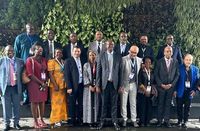During a recent visit to Saudi Arabia, Kamal Al-Wazir, Egypt's Deputy Chairman of the Council of Ministers for Industrial Development and Minister of Transport, along with Engineer Saleh bin Nasser Al-Jasser, the Saudi Minister of Transport and Logistics Services, toured the Riyadh Metro. This visit aimed to assess the metro's operations and management, highlighting the importance of such projects in facilitating citizen mobility.
Al-Wazir emphasized that the Riyadh Metro, a green mass transit solution, aligns with President Abdel Fattah El-Sisi's directives to expand sustainable public transportation systems. "These initiatives are crucial for providing the highest levels of service to the public," he stated during the visit.
After inspecting the metro, Al-Wazir met with Engineer Khalil bin Ibrahim bin Salma, the Deputy Minister of Industry and Mineral Resources for Industrial Affairs in Saudi Arabia. They discussed enhancing cooperation and integration in the industrial sector, a meeting attended by Ihab Abu Serie, Egypt's Ambassador to Riyadh, and other officials.
Engineer Khalil welcomed Al-Wazir, conveying greetings from Bandar bin Ibrahim Al-Khorayef, Minister of Industry and Mineral Resources, who was on an official trip abroad. He stressed the Saudi government's commitment to strengthening joint industrial cooperation with Egypt.
Al-Wazir expressed Egypt's ambition to become a regional industrial hub, a vision supported by President El-Sisi. He noted that Egypt has factories capable of producing various industrial goods, including manufacturing units at SEIMAF and Nerk, as well as naval vessels and components for the fast dual-purpose electrical grid project.
"Egypt is ready to collaborate in manufacturing sectors such as iron, aluminum, automotive, and solar energy units," Al-Wazir remarked, pointing to 151 investment opportunities, including 28 promising ones, that could foster joint ventures. He highlighted the potential for Egyptian companies to operate in Saudi Arabia and attract Saudi investments to Egypt.
He also mentioned the importance of industrial integration between the two nations, which could facilitate Egyptian exports to Saudi Arabia and vice versa. This collaboration is vital not only for meeting local market demands but also for exporting products to African countries, leveraging Egypt's strategic geographical position.
The meeting concluded with a commitment to intensify efforts from both sides to achieve significant progress in industrial cooperation.
In a related development, Ahmed Attaby, head of the exporters and importers division in Giza, met with Richard Negatia, head of the East Africa division, during the World Chambers Congress in Nairobi, Kenya. Their discussions focused on enhancing trade and investment opportunities between Egypt and East African countries.
The East Africa division represents the private sector interests in East Africa, aiming to foster economic and trade integration among member states including Kenya, Uganda, Tanzania, Rwanda, Burundi, and South Sudan. The organization also includes potential partners from neighboring countries such as Somalia and Djibouti.
Attaby emphasized the need for improved cooperation between the private sector and governments to enhance the business environment and facilitate dialogue to tackle common challenges. He noted that while trade with East Africa is growing, it still faces hurdles related to political stability and logistical efficiency.
The current intra-regional trade volume among East African countries stands at approximately $10.7 billion, with Egypt's trade with these nations reaching about $1.1 billion in 2022, marking a 22% increase from the previous year. This growth is attributed to the launch of the African Continental Free Trade Area (AfCFTA), which is expected to further boost trade relations.
Egypt’s exports to East Africa include petroleum products, fertilizers, plastics, and engineering goods, while imports consist of coffee, tea, cloves, gold, tantalum, and crude oil from South Sudan. The African Development Bank projects that regional trade will grow by 5-7% annually by the end of 2025, driven by increased investments in energy and communication sectors.
As trade relations strengthen, the potential for economic collaboration between Egypt and its East African counterparts continues to expand, highlighting the strategic importance of regional integration in fostering sustainable growth.






